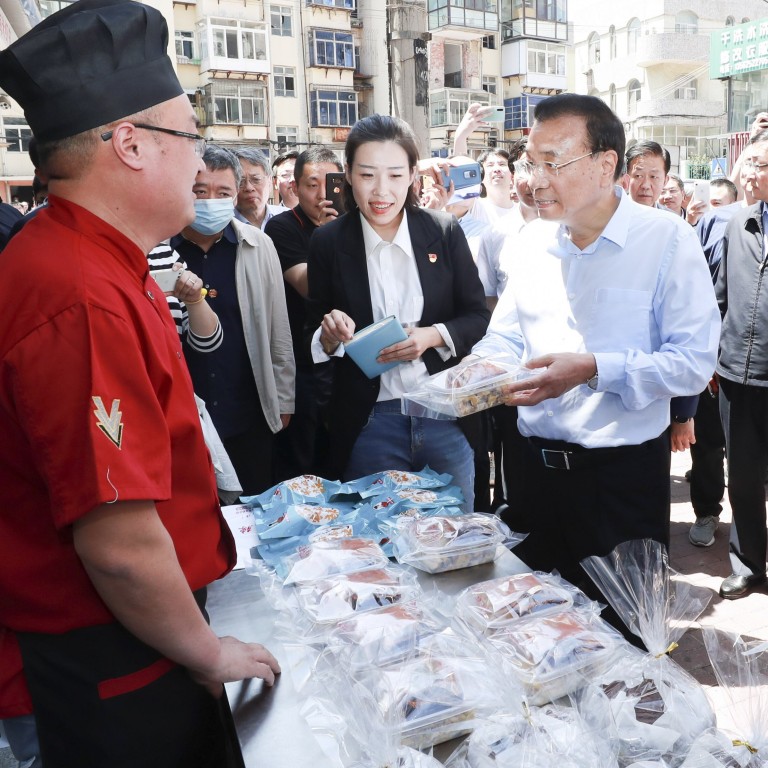
China turns to ‘street vendor economy’ to help manage unemployment crisis
- New policy to encourage street vendors is backed by Premier Li Keqiang as a way to create self-employed businesses to absorb newly unemployed
- Policy is a U-turn for the government, which previously cracked down on street vendors as part of urban rejuvenation programmes
China has turned to a “street vendor economy” – encouraging people to set up open-air stalls as full or part-time jobs – amid an unprecedented wave of unemployment caused by the economic fallout following the coronavirus outbreak.
Street vending, often a way for the urban poor and migrants from rural areas to make a living, has until now been viewed as an eyesore by China’s urban authorities as cities sought to enhance their urban landscapes with skyscrapers, squares and even fake antique city appearances.
As most street vendors and temporary stalls are not properly licensed, their existence was also seen as a way to evade rent and taxes. The capital city of Beijing took extreme measures in a massive beautification campaign in 2017 by shutting down small shops and cracking down on vendors, kicking out hundreds of thousands migrant workers as members of an unwelcome “low-end population”.
They are part of China’s vitality just like those high-end, great and classy businesses … self-employed businesses must survive and thrive so that our country can get better
In a visit to the city of Yantai in Shandong province this week, Premier Li said street stalls and small shops “are important sources of jobs” and an integral part of people’s normal lives.
“They are part of China’s vitality just like those high-end, great and classy businesses … self-employed businesses must survive and thrive so that our country can get better,” said Li, who added that China must allow people to create jobs for themselves.
Li praised the city of Chengdu in Sichuan province for “creating 100,000 jobs by allowing 36,000 street stalls” and referred to the late 1970s when the government allowed younger people returning from the countryside to start self-employed businesses.

05:41
Why China's elderly farmers can't afford to retire
Li’s support for the street vendor economy has unleashed enthusiasm among many citizens to set up street stalls and forced the country’s urban landscape management force, known as Chengguan, to change from a sworn enemy of the vendors into a staunch supporter.
According to Chinese state radio, Chengguan in Ruichang of Jiangxi province have set up designated places for street stalls and invited vendors to start businesses. Chengguan in Shijiazhuang, the capital city of Hebei province, have studied ways to promote the street vendor economy, according to an official statement on its social media account.
Given the long history of violent, and sometimes deadly, conflicts between street vendors and Chengguan, a law enforcement team of at least half a million across the country, the 180-degree change shocked many people.
Who would have thought the day would come when family planning officials would beg people to have a second child and Chengguan would invite vendors to go out onto the street?
“Who would have thought the day would come when family planning officials would beg people to have a second child and Chengguan would invite vendors to go out onto the street?” read one comment on Chinese messaging app WeChat.
Technology firms from Tencent to JD.com have also jumped on the bandwagon by promising to help street vendors and smaller shops. A van that can be used as a temporary street stall has become the latest online hit in China, with the stock price for manufacturer Wulin Motors tripling in Hong Kong this week.
But at the same time, the longer-term economic implications of allowing people to set up street stalls are unknown.
One immediate outcome will be some relief of unemployment pressure as people who have lost their formal employment can try to make a living by starting a small self-employed business.
A street vendor economy should be managed but not banned totally
In the early 1980s when China started to embrace a market economy, China allowed self-employed businesses to boom. Its former paramount, Deng Xiaoping, was famous for supporting a particular sunflower seed vendor in Anhui province as a way to encourage entrepreneurship.
Many of China’s tycoons, including Lenovo founder Liu Chuanzhi and Wahaha Group founder Zong Qinghou, have previously had experiences in street vending.
Cai Fang, a vice-president at the Chinese Academy of Social Sciences, said this week that China’s policy of encouraging street vendors should become permanent as it is an effective way to create jobs.
“A street vendor economy should be managed but not banned totally,” Cai said.

